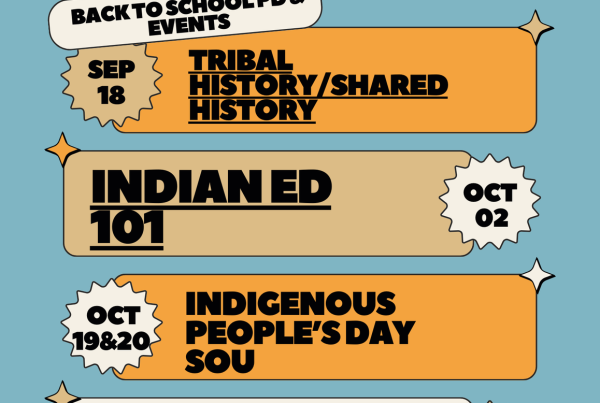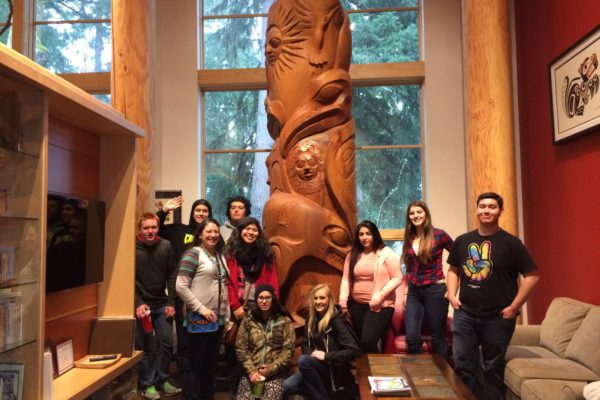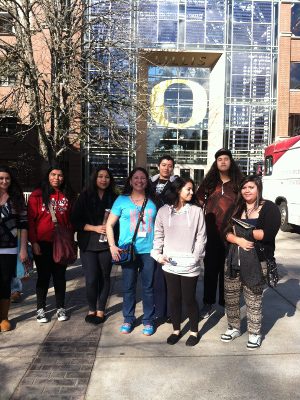The English Learners/ Indian Education / Migrant Education / SOBAASS program provides services to Jackson, Josephine and Klamath County school districts. We help districts create, implement, and maintain programs that provide equitable learning opportunities for all. Our goal is to develop curricula and teaching strategies that embrace each learner’s unique identity and to help break down barriers that prevent students from succeeding in school. Funding is provided primarily through Title 1C Migrant and Title VI Indian Education grants, with additional funding provided by SOESD and local foundation grants.
CONTACT
541-776-8520
ELL@soesd.k12.or.us
- English Learners Inservice & Training
- Direct Migrant Services
- Title VI Indian Education Services
- News
- Southern Oregon Black / African American Student Success (SOBAASS)
The SOESD English Learners/ Migrant Education program provides workshops, presentations, coaching, and consultations on the building, district, and regional levels to school districts in Jackson, Josephine and Klamath counties. Workshops, presentations, and coaching can be individualized to meet your building/district’s needs.
SELD (Systematic English Language Development)
Systematic English Language Development (SELD) is a framework developed by Susana Dutro to assist teachers and administrators in designing and implementing effective English Language Development programs. The SELD Booster course will provide participants an opportunity to update SELD materials and to analyze and strengthen lessons they have already taught. Participants may also plan new lessons using the refined framework. The course is based on the Focused Approach to Systematic English Language Development Instruction developed by Susana Dutro.
SELD Resources: Units and Lesson Plans
- E.L. Achieve’s Systematic ELD website
- Hueneme Elementary: Avenues Lesson Plans, K-5.
DOWNLOAD FILE - Ord Terrace Elementary School: Lessons linked to Carousel.
DOWNLOAD FILE - San Diego Unified School District’s Year Long ELD set of units For their Year at a Glance overview.
DOWNLOAD FILE - Whittier City School District’s has plans plus many additional resources for various levels–28 weeks worth for grades K-2 and 3-5, plus some started on 6-8.
DOWNLOAD FILE
SIOP (Sheltered Instruction Observation Protocol)
This workshop provides participants with an intensive and comprehensive approach to implementing the SIOP model (Sheltered Instructional Observational Protocol). Sheltered English is a method of instruction used throughout Oregon by content area teachers to meet the academic needs of English Learners. Often characterized as “just good teaching”, sheltered English focuses on higher order thinking skills by using context embedded approaches, visual organization, and making the materials concrete. A “must” workshop for the teacher who knows that everybody can learn if the methods used are appropriate for the learner. The SIOP model (Sheltered Instructional Observational Protocol). SIOP is one method of instruction used throughout Oregon by content area teachers to meet the academic needs of English Learners. The model falls under the larger category of Sheltered English Instruction.
As part of our SIOP training, we offer specific instructional strategies which can be downloaded here. This link is a zipped file of all of our “Blue Sheets’, which describe the strategies demonstrated in the workshop.
SIOP Resources
Here are copies of some of the documents used with those strategies, which can be revised for your classroom use:
Constructing Meaning: Explicit Language for Secondary Content Instruction
Constructing Meaning offers teachers the process and the tools to identify specific, content-driven language objectives and design instruction to address those objectives. A backward design approach is fused with the principles of second language acquisition to create student-centered classrooms in which rigorous academic teaching includes explicit language instruction. Constructing Meaning is designed for secondary teachers and is particularly useful for Social Studies and English Language Arts teachers.
Constructing Meaning is a product of E. L. Achieve and you can read more about its background by clicking here.
Constructing Meaning Tools and Templates
Created by teachers in the SOESD Region.
GLAD (Guided Language Acquisition Design)
GLAD is a model of professional development in the area of language acquisition and literacy. GLAD promotes English language acquisition, academic achievement, and cross-cultural skills. Tied to standards, the model trains teachers to provide access to core curriculum using local district guidelines and curriculum. During the staff development, teachers are provided with the instructional strategies, the theory and research that support the model, and the curriculum model that brings these all together in the context of district and state frameworks and standards. The second part of the training is a demonstration session in the classroom where the model is demonstrated with students.
GLAD Units and Lesson Plans
Interpreter/Translator Training
The Interpreter/Translator workshop focuses on the importance of the selection and training of interpreters and translators in the school setting, while clarifying the distinction between the two roles. This is a participatory experience, which provides a forum for discussion of pertinent interpretation/translation issues and practices. We offer both an Introduction to Interpretation 3-day workshop and an Intermediate Interpretation workshop that focus on IEP interpretation.
Diversity, Equity and Inclusion
Equity is achieved when all students receive the resources they need so they graduate prepared for success after high school. – Center for Public Education
SOESD is currently the recipient of a Meyer Memorial Trust grant to support our districts in their equity efforts. The current collaborative of districts includes SOESD, Medford, Ashland, Phoenix-Talent, Central Point, Eagle Point, and Grants Pass.
Diversity, Equity and Inclusion Resources
Migrant after school, summer school, and preschool programs are available to qualified migrant students in Jackson, Josephine, and Klamath counties. The programs are designed to support students in meeting challenging academic Reading and Mathematics standards. In addition, Migrant students automatically qualify for Free Lunch and receive an accident insurance policy. Migrant staff also link families to community support services as needed.
Migrant After School Programs
Migrant After School programs are implemented by the local districts and funded by SOESD’s Migrant Education. They provide homework help and tutoring at many different sites throughout our region.
Migrant Summer School Programs
Migrant Summer School programs are run by the local districts and are funded by SOESD’s Migrant Education. They serve preschool to high school students.
Migrant Preschool Programs
SOESD implements and funds preschool programs by Head Start, Child Care Resource Network (CCRN), Oregon Child Development Coalition (OCDC) and SOESD’s Preschool Specialists.
- March Preschool Newsletter
- Jackson County Preschool February Newsletter
- Klamath County Preschool Newsletter February 2021
Parent Advisory Committee
Parent Advisory Committees are school district based and involve parents in the planning and allocation of Migrant Education funds for summer and other supplemental school programs. Elected officers serve as liaisons between the families and the schools as well as being involved in other regional and state committees on equity, diversity and inclusion. SOESD’s Parent Involvement Specialists support district level PACS and design and host Regional PAC meetings to inform and involve parents in the education of their children.
Secondary Transition Program (Sobresalientes)
Sobresalientes offers assistance to Migrant seniors with the process of obtaining scholarships and selecting post-high school educational opportunities. These include FAFSA preparation activities, scholarship application support, and instruction in essay writing and letters of recommendation strategies.
Academia Latina
Academia Latina is a one-week summer residency program for Latino/a middle school students, held at Southern Oregon University in August. The program is designed to help middle school students orient themselves as future college students, and to provide direct instruction in math, reading, leadership, theater, technology, science, art, and dance. High schools students participate in a Leadership experience.
High School Equivalency Program (HEP)
HEP is a University of Oregon-based residency high school equivalency diploma program for migrant students who meet certain criteria. Students must be between the ages of 16 to 21, have dropped out of school, complete the math and reading tests, written essay and application.

The Southern Oregon Indian Education Program’s purpose is to provide services that address the unique educational and culturally related academic needs of American Indian and Alaska Native students in Jackson and Josephine counties in order to help them achieve to the same high standards expected of all students. It is funded by Title VI Indian Education, a federal program. The participating school districts act as a Consortium in order to coordinate services to our eligible American Indian/Alaska Native students and combine our resources and efforts for efficiency and cost-effectiveness.
Contact:
Teresa Cisneros
Carrizo/Comecrudo Nation of Texas
She/Her/Hers
Indian Education Facilitator
541.245.4619 – office
541-892-0016 – cell
Teresa_Cisneros@soesd.k12.or.us
SERVICES
Strong Futures
“Towards a strong future path”
The Strong Futures program assists Native high school students and their families to prepare for success after high school through the following offerings.
Native American Student Unions
The project will create and implement sixteen new NASUs and continue to support three others within the five local districts with the highest number of AI/AN students registered in the Title VI Indian Education Program. The NASUs will implement culturally responsive and sustaining activities that will affirm identity for middle and high school youth. These activities will include our Native Games Day, Indigenous Peoples’ Day Celebration, Strong Futures Program, making regalia, sharing of different traditions from all tribes, mentorship from Native college students, and teachings from local Elders, among others. The NASUs will also provide connection to a caring staff member, peer support, a respectful space for parental involvement, and access to our own SOESD Indian Education Facilitator. The SOESD Indian Education Facilitator will create the curriculum and organize of the activities for all NASUs.The program’s goals are to increase graduation rates, increase achievement by closing opportunity gaps, increase attendance rates, and address disproportionate discipline of AI/AN students. The program is also heavily involved in efforts to diversify the educator workforce and in providing professional development opportunities by offering Senate Bill (SB) 13 Tribal History / Shared History workshops.
Campus Visits
The Strong Futures program takes groups of students who are enrolled in the Indian Education program on college campus tours throughout Oregon. This is an opportunity for students to experience campus life and see what options they have after high school.
We can help with:
- Financial aid and scholarships
- Senior and service projects
- College and vocational school applications
- Writing and reviewing application essays
- Finding Tribal educational resources for funding and support
Indian Education Links
Tribes
- Burns Paiute Tribe
- Confederated Tribes of Coos, Lower Umpqua and Siuslaw Indians
- Confederated Tribes of Grand Ronde
- Confederated Tribes of Siletz
- Confederated Tribes of the Umatilla Indian Reservation
- Confederated Tribes of Warm Springs
- Coquille Indian Tribe
- Cow Creek Band of Umpqua Tribe of Indians
- Klamath Indian Tribe
More Resources
- The Wisdom of the Elder Curriculum Project This is a very well organized site!
- The Oregon Department of Education’s Indian Education Resources
- Oregon Indian Education Association
- United National Indian Tribal Youth (UNITY)
- Education Northwest’s Indian Reading Series: Stories and Legends of the Northwest
- United National Indian Tribal Youth – Web Links
- OSU’s Native American Longhouse, Eena Haws – Links
- Native Youth Magazine
Title VI Southern Oregon Education Service District Indian Education Program
- Consortium Parent Committee Members (CPC) 2024-2025
- Co-Chairperson Josephine County: Echo Miller
- Co-Chairperson Jackson County: Luzita -Angélica Marbain (Angélica)
- Secretary/Treasurer: Jacklyn Holzhauser
- Jackson County Member: Randall McAllister
- Jackson County Member: Lola Jackson
- Josephine County Member: Stephanie Ledford
- Josephine County Member: Jamaya Obie Brown
- Student Leader Position Josephine County: Alyssa Lake
- Student Leader Position Jackson County: Amanda Lovik Pearce
View BYLAWS
Meeting Schedule:
First Monday of each month March, April, May, June 6:30-7:30 PM Monthly check in zoom
Zoom Meeting
https://soesd.zoom.us/j/96500943910
Meeting ID: 965 0094 3910
How to register for the program
Parents/guardians needs to fill out the Title VI Student Eligibility Form (Form 506) (PDF file) in order to register their American Indian/Alaska Native student. Please use a separate form for each student. Please return the completed form to: SOESD Indian Education, 5465 S. Pacific Hwy., Phoenix, OR 97535
Scholarship Resources



Oregon’s Senate Bill 13: Tribal History/Shared History Grant
SOESD ‘s award of this grant allows us to foster the implementation of the inclusion of a K-12 Native American Curriculum in K-12 schools in the region. We are well situated to provide professional development to develop and grow staff and educators through our American Indian/Native Alaskan.
Educator Cadre Project in order to implement curriculum that will increase tribal awareness in all students and target student success in our tribally diverse American Indian student body.
American/Indian/Alaskan Native Student Success Grant
This Oregon Department of Education grant project will create and implement sixteen new Native American Student Unions and continue to support three others within the five local districts with the highest number of AI/AN students registered in the Title VI Indian Education Program. The program’s goals are to increase graduation rates, increase achievement by closing opportunity gaps, increase attendance rates, and address disproportionate discipline of AI/AN students. The program is invested in professional development opportunities through Senate Bill (SB) 13 Tribal History / Shared History workshops.
House Bill 2016 directs the Department of Education (ODE) to develop and implement a statewide education plan for African American/Black students who are in early childhood through post-secondary education programs. The ODE convened an advisory group comprised of members of the African American/Black community and other community partners from across the state of Oregon to advise the Department on the creation and implementation of the plan. A PDF of the plan is available here.
The plan addresses:
- The disparities experienced by African American and Black students in every indicator of academic success
- The historical practices leading to disproportionate outcomes for the students
- The educational needs of the students from early childhood through post-secondary education by examining culturally responsive and appropriate best practices in this state and across the nation
- The ODE has awarded a grant to SOESD in partnership with school districts in our region and two Community Based Organizations, BASE and BSOA, to implement strategies developed in the plan. The activities of this multi-district, multi-agency collaboration, called SOBAASS, are described below.
- Monthly Parent Group Meetings facilitated by the SOBAASS Family Engagement Specialist
- Ongoing Afroscoutz activities hosted by BASE
- Support for Black Student Unions (BSUs) throughout our region
- The Black Youth Leadership Summit and Black Youth Summer Institute hosted by BSOA
- Advocacy for students and parents from the SOBAASS Specialist, D.L. Richardson. You can email D.L. at dl_richardson@soesd.k12.or.us
- HR work on hiring and retaining BIPOC staff facilitated by the SOBAASS District Specialist






